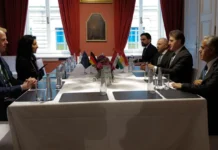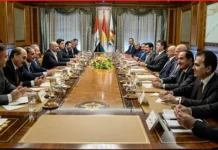Tishwash: The electronic payment system has stopped in most Iraqi government departments – Urgent
A Baghdad Today correspondent reported that the electronic payment system was suspended in most government departments in Iraq on Monday morning (October 20, 2025), disrupting citizens’ transactions and delaying the disbursement of some financial dues.
According to information received by our correspondent, the outage affected electronic payment systems, halting transfers at a number of service institutions and ministries. Technical teams are now working on maintenance to restore the system.
A Baghdad Today correspondent indicated that the relevant authorities expect service to be gradually restored over the coming hours after the technical inspection is completed. link
Tishwash: Iraq boosts its gold reserves to 162.5 tons
Iraq continues to boost its gold reserves, with stored quantities increasing from 100 tons to 162.5 tons in recent years, according to an economic expert.
Expert Abdul Rahman Al-Mashhadani explained in a statement to Al-Furat News that: “Iraq continues to purchase gold to bolster its national reserves, although the quantities acquired remain limited compared to the ambitious plans to enhance financial stability.”
He pointed out that “increasing gold reserves represents an important step towards strengthening the national economy and supporting financial liquidity, as well as being a strategic safety factor in the face of global market volatility.”
Al-Mashhadani emphasized that “Iraq pays special attention to gold as part of its economic policy, as it is an important tool for diversifying assets and protecting reserves from potential economic and financial risks.” link
******************
Tishwash: With the rise of the Chinese yuan and local currency settlements, can Iraq dispense with the dollar?
The modern Iraqi economy was formed on the basis of a single-source oil rent, entirely dependent on the sale of crude oil and the settlement of revenues in US dollars.
This pattern made Iraqi monetary policy directly dependent on the US financial system, with revenues deposited in accounts at the Federal Reserve Bank of New York and managed according to international regulatory arrangements linked to financial compliance and anti-money laundering programs.
According to economic studies issued by the World Bank and the International Monetary Fund, approximately 90 to 95 percent of Iraq’s public revenues come from oil, making any fluctuation in the dollar or a decline in global demand for oil a direct threat to liquidity and the general budget.
Financial economists point out that the Central Bank of Iraq does not have absolute freedom to manage its reserves, as most of its transactions are restricted to US transfer networks, and the global SWIFT system closely monitors financial transfers, preventing any parallel transactions outside the dollar system.
According to recent academic estimates, excessive reliance on the dollar has created a distorted import environment, with the Iraqi market tending toward consuming foreign goods without boosting domestic production. This has deepened economic exposure and tied the domestic financial cycle to fluctuations in US monetary policy.
In contrast, China has been working for more than a decade to build a parallel financial system that would challenge the dollar’s dominance, by expanding the use of the yuan in international trade and establishing alternative financial institutions such as the new Asian Development Bank and the China Payments System (CIPS).
In 2023, Beijing announced that more than 52.9 percent of its cross-border transactions were settled in yuan, surpassing the dollar for the first time in modern history. While this percentage reflects a gradual shift rather than a sudden reversal, it points to a fundamental shift in the balance of global financial influence.
International economics researchers believe that China’s agreement with Australian company BHP to settle iron ore trade in yuan represents a pivotal moment in the history of global trade, as it removes one of the world’s most traded commodities from the dollar. This move, along with a series of similar agreements with other countries, most notably Russia and Saudi Arabia, indicates that the yuan is beginning to transform from a local currency into a strategic settlement tool in the international trade system.
Beijing has also relied on comprehensive institutional tools to bolster market confidence in the yuan, such as linking the currency to a strong gold reserve system and ensuring its stability through prudent monetary policies. This has made it an increasingly attractive option for countries seeking alternatives to the dollar amid crises of US sanctions and restrictions.
Iraq’s position in the transformation equation
Although Iraq was one of the first oil-producing countries to open up trade to China, its position in the global monetary transition remains extremely weak. Baghdad’s banking structure remains traditional and relies almost entirely on dollar transfers via the US system.
Economic researcher Othman Karim confirmed to Baghdad Today that the idea of abandoning the dollar “is illogical at the present time,” noting that Iraq “sells oil and receives revenues through the US Federal Reserve, and currently has no realistic mechanism for settling its transactions in another currency.”
He adds that the shift to the yuan requires “a radical change in monetary policy, the signing of direct banking agreements with China, and the development of intermediary electronic payment tools that can bypass US restrictions.”
According to economists, the challenge in Iraq is twofold: technical, related to the absence of an independent financial transfer structure, and political, related to US pressure and Iraq’s close ties to the Western system for managing its finances.
Trade with China, despite its size, remains settled in dollars, as Iraqi companies do not have accredited accounts with Chinese banks. Analysts believe that any serious attempt to transition to the yuan requires profound institutional reform of the central bank, enhanced financial transparency, and the establishment of a dual reserve in yuan and gold as a preliminary step toward monetary diversification.
While it is difficult to completely sever the link to the dollar, some experts do not rule out a partial move toward monetary diversification, through limited agreements with China to settle a portion of non-oil imports in yuan.
Given China’s increasing openness to the Middle East and its signing of yuan-denominated settlement agreements with Saudi Arabia and the UAE, Iraq could consider establishing a trade barter mechanism under which it would import Chinese goods in exchange for oil exports, without having to use the dollar.
Some monetary researchers also suggest that Baghdad begin allocating a portion of its foreign exchange reserves in yuan, as a symbolic step to expand financial diversification, while developing banking agreements with the People’s Bank of China to facilitate direct transfers.
However, these paths remain subject to complex political factors, most notably the relationship with Washington and the fear that any move toward China could be interpreted as a step toward an anti-Western geopolitical axis.
Ultimately, economic analysis shows that completely eliminating the dollar in Iraq is not possible in the short or medium term, but it remains a long-term strategic goal in light of global changes.
Iraq, as a dependent rentier economy, needs to first build its production and commercial independence before considering monetary independence. While the rise of the yuan opens a window for rebalancing the international financial system, it does not negate the fact that the dollar still holds the deepest and most widespread structure.
Therefore, in the coming period, Iraq will remain governed by the duality of monetary and political power: adopting the dollar as the primary currency for governing the state, while closely monitoring the transformations taking place in the East, where China is rewriting the equation of global financial influence, step by step. link





